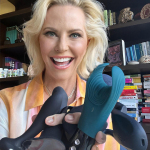Is there a sexual healer that’s right for you?
People often ask me to explain the difference between a sex therapist, a sex coach, a marriage counselor, a sexologcial bodyworker, et cetera.
First let me say that I am none of these; I am a trusted hot sex advisor with a wealth of personal experience, infectious enthusiasm, an insatiable interest in all things related to sex, the willingness to experiment and share my discoveries, and a proven ability to translate all that knowledge into practical, actionable skill- and confidence-building activities that transform a lot of people’s sex lives. I offer sex techniques that increase your sexual intelligence. And I integrate easy-to-learn communication skills into my advice. My aim is to help you lovingly embrace your sexual potential by opening your eyes to what’s possible. And sometimes my role is helping you overcome limiting beliefs you have about your sexuality so you can fully enjoy this vital aspect of your life.
Now you know me. What is the difference between a sex coach, a sex therapist, a marriage counselor and a sexological body worker?
Is there a sexual healer that’s right for you?
First let’s break down the variety of professions, designations, certifications, modalities, and areas of expertise in the realm of human sexuality.
You need to be informed as to who’s who and what’s what when you are looking for professional help. So here goes.
SEXOLOGISTS EXPLAINED
First let’s talk in the broadest of terms, i.e.: sexologist. The field of sexology is quite vast; sexologists are involved in the scientific study of sex, sexual functions, behaviors, and interests. Sexologists are cross-disciplinarians who draw from many academic fields: psychology, biology, anatomy & physiology, medicine, epidemiology, and sociology.
Sexologists’ interests are all-embracing when it comes to our sexual nature. They are concerned with sexual development, sexual orientation, sexual relationships, gender identity, sexual activities, sexual interests (both typical and atypical), sexuality among the mentally or physically disabled, and sexuality across the lifespan.
Sexologists study a wide range of concerns from sexual dysfunctions and disorders (anorgasmia, vaginismus, erectile dysfunction, premature ejaculation) to the ecstatic and transformative potential of sexuality. Sexologists can be researchers, academics, educators, or clinicians.
Both sex researchers and sex educators fall under the umbrella term sexologist, although their work often reaches beyond the laboratory or classroom in the form of books, lectures, television and internet. Any number of sex researchers and educators have made a career of sharing their insights; some have become well-known and well-loved public figures who champion sex and our sexual nature.
A clinical sexologist specifically works directly with clients either one-on-one, as a couple, or in groups, and typically has a license or certification of some sort.
PROFESSIONAL SEX THERAPISTS
Certified sex therapists and counselors are mental health professionals who are trained to address sexual issues and concerns. In the US, The American Association of Sexuality Educators, Counselors and Therapists (AASECT) credentials sex therapists. Since the 1970s, the AASECT certification process has ensured that practitioners who call themselves sex therapists have significant education and extensive training. At present, AASECT certified sex therapists must have a graduate degree, post-degree clinical experience, and hold a license in their state to practice medicine, psychology, social work, counseling, nursing, or marriage and family counseling/therapy. These professionals are well-equipped to discuss sex and sexuality with clients.
Sex therapists focus on particular concerns such as low desire, premature ejaculation, anorgasmia, etc., but they also focus on containing, processing, and healing emotions, as well as examining the psychodynamic roots of sexual attitudes, behaviors, fixations, etc. Sex therapy also addresses issues around intimacy, communication, and relational dynamics such as infidelity or non-traditional (i.e.: open or polyamorous) relationships.
Sex therapy, like psychotherapy, typically takes time, often months or years, especially if sexual trauma, abuse, or violence is part of a client’s history. In general, the term counseling refers to shorter term, crisis-oriented interventions. Whereas therapy is a journey to understand oneself by looking back at what was to comprehend what is and become empowered to move toward a better future. Counseling tends to focus on immediate concerns from a problem-solving perspective.
SEX COACH PLANS
Much like a life coach, a sex coach will help you assess where you are in relation to where you want to be. The primary role of a coach is to assist you in formulating a plan and identifying the action steps that will help you move toward your goal.
It is important to note that coaching, as a field, is unregulated. Anyone can call him or herself a “coach,” and the same is true of sex coaches. However, there is a worldwide certifying body and professional membership organization for sex coaches, The World Association of Sex Coaches (WASC), with members in 8 countries. Sex coaches typically work with clients in person, by telephone, or virtually via Skype and the like. WASC provides members with continuing professional development opportunities, although members do not have continuing educational requirements such as are required of sex therapists.
Perhaps the most important skill a sex coach can have is the ability to assess a client’s needs and know when to refer out. In general, sex coaches are not qualified to help clients resolve deeper issues. However, a client may want to take a “team” appraoch and engage both a therapist and a coach to improve their sex life. A good coach will know his her limitations and have an array of helping and healing professionals in their referral network.
To reiterate, the purview of coaching is a future focus on a particular goal. It’s about deciding what you want, identifying the steps, accepting guidance and direction, formulating an action plan, being accountable for follow-through, and acknowledging and celebrating progress toward your goal. If you simply want to experience orgasm, a sex coach can help. If you have deep-seated issues related to sexual trauma that prevents you from getting aroused enough to reach a climax, you do well to work with a licensed sex therapist with specific training in resolving trauma.
LMFTS
Let’s talk Licensed Marriage and Family Counselors. It’s important to know that “licensed” doesn’t necessarily mean qualified, or comfortable for that matter. Marriage counseling is not sex therapy; they are two entirely different disciplines that may or may not overlap, depending on the individual practitioner and their scope of practice. Many professionals in the fields of counseling, psychotherapy, and social work have what sex therapists refer to as the “Donut hole approach,” i.e.: they avoid discussions of sex simply because they are not comfortable talking about it. Therefore, if you are seeking help with sexual concerns, it is very important to find someone who is both well-trained and comfortable discussing the full range of issues that can arise around sexuality.
Sexological bodyworkers are somatic, erotic educators who assist individuals, couples and groups who want to deepen their experience of embodied sexuality and learn to direct their own erotic development. Sexological bodywork helps clients with a wide variety of developmental processes from learning about their sexual anatomy and working through sexual issues, to increasing their capacity for sexual arousal and accessing meditative or ecstatic states.
Distinct from sex coaches and therapists who typically work with clients from the neck up, sexological bodyworkers are hands-on specialists who work directly with the body through breathwork, touch, massage, pelvic release, etc. Their focus is often on releasing physical tension whether due to scar tissue or emotional factors in order to increase an individual’s ability to experience pleasure.
Sexological bodyworkers are trained sexologists whose certification is government-approved in many countries. It is a legal and regulated profession in California, Canada and the UK, but it is still considered illegal in much of the US.
SEXUAL SURROGATES
Sex surrogates or surrogate partners, are hired professionals who provide direct sexual activity in a therapeutic context, typically as part of a client-therapist-surrogate triad. In general, clients are referred to a surrogate directly by their “neck-up” sex therapist. Sexual surrogacy has gained favor in recent years, largely due to the movie “The Sessions,” which offers a compassionate, relatively factual glimpse of this unique modality. A sex surrogate typically works with a client for a specific number of sessions toward a specific result.
Also in the realm of sex education are Tantra teachers and practitioners. This includes everything from yoga teachers with an emphasis on worshipping the Divine Feminine to tantrikas and dakas who give sensual and sexual massage and/or who actively make love with their students, followers, and devotees. Tantra is an ancient yogic tradition with spiritual roots that reach far beyond sexuality into realms of practice that make little sense in the context of Western civilization. However, Westernized Tantra has tremendous value in its ability to help couples connect more deeply and form stronger intimate bonds. Tantra is a powerful modality, however, it is entirely unrelegated, so don’t assume a person who talks about Tantra is qualified to teach and guide you along that path.
In all cases, regardless of the type of professional help you want, do your research. A competent professional will be very forthcoming about their methods, modalities, perspective and process. Any ethical sex professional will offer a free introductory consult on the phone. Talk to someone before you make an appointment. See if you feel comfortable talking to them. Get your questions answered. A true professional will do whatever it takes to ensure you feel safe to speak openly about your concerns. Talk to more than one person. Ask about their qualifications and find out how much experience they have dealing with your specific issue. If they don’t have the expertise you need, they may know someone who does and be able to refer you. Most importantly, trust your gut. Sexuality is such a vital aspect of overall life-satisfaction and well being that you want to work with a highly qualified professional you instinctively know you can trust.
If you want to heal your partner’s physical trauma, I suggest the sensual massage techniques in my Steamy Sex Ed®️ Video Collection. You can be notified of our next sale by entering your name and email address when you click this link.







